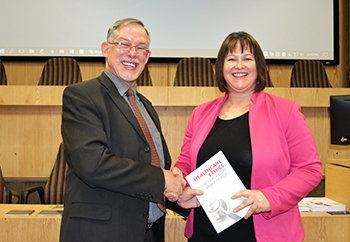Latest News Archive
Please select Category, Year, and then Month to display items
10 March 2022
|
Story Anthony Mthembu
|
Photo Unsplash
 The No Student Hungry team gearing up to start distributing food parcels to the selected students.
The No Student Hungry team gearing up to start distributing food parcels to the selected students.
The UFS is one of the many institutions of higher learning where food insecurity is an active issue. However, the
No Student Hungry Programme is one of the initiatives launched at the university to assist in fighting food insecurity at the institution.
The purpose of the programme
Since its inception in 2011, the initiative has assisted many students in acquiring a healthy meal. Additionally, the Food Environment Office also hands out food packages, so that students can continue to achieve academically. “We are trying to develop a healthy environment for students and make it easier for them to have a nice and healthy meal,” stated Annelize Visagie, who heads the Food Environment Office at the UFS. The Food Environment programme is spread out on all three campuses, each with its own facilitators. Furthermore, the programme mainly caters for students who are not funded by the National Student Financial Aid Scheme (NSFAS) but who are excelling academically. The abovementioned students apply for assistance online, and a list is then drawn up of students who receive assistance for the year.
Alternative solutions to keep the initiative running
On the Bloemfontein Campus, the No Student Hungry Programme will be catering for 200 students in the 2022 academic year, assisting them with a daily nutritious meal. Additional food parcels are also handed out to provide further assistance. “We give food parcels to the students on the list every Tuesday and Thursday at the Thakaneng Bridge,” Visagie highlighted. However, she argues that catering for the student population through this programme can be a challenge, as the demand for assistance is growing rapidly and the ability to assist is limited. The programme relies on partnerships and sponsors to assist the student body. In fact, the coordinators of the programme currently have a memorandum of understanding with Tiger Brands according to which they deliver around 100 food parcels for distribution.
In addition, the coordinators have put in place alternative measures to ensure that they can provide more food to students. “The
Kovsie Act Office, in partnership with the
Department of Sustainable Food Systems and Development, has started a food garden where healthy and nutritious produce are grown, in order to add value to the distribution,” she indicated. Although the programme can only assist to a point, students who are in desperate need of assistance are never turned away. In fact, the
Social Support Unit at Thakaneng Bridge usually assists students with food vouchers for a maximum of four days.
A commitment to teaching healthy eating habits
The programme is not only committed to curbing food insecurity, but also to ensuring that students have a healthy and balanced diet. As such, a booklet is being issued by the
Department of Nutrition and Dietetics in collaboration with the Department of Sustainable Food Systems and Development, which contains ways in which students can make a healthy meal using some of the ingredients offered in the food parcels.
“We want to teach students how to eat healthy in the cheapest way, because they don’t have a lot of money to buy expensive food products,” Visagie argued.
Ethics at the heart of healthcare practice
2017-05-17

Prof Gert van Zyl during the launch of Health
Ethics for Healthcare Practitioners with
Prof Laetus Lategan at the Central
University of Technology.
Photo: Supplied
The Central University of Technology (CUT) in partnership with the University of the Free State (UFS) launched a newly published book: Health Ethics for Healthcare Practitioners that aims to raise awareness among healthcare practitioners and patients about various unethical challenges faced by healthcare services in both the private and public sectors.
Prof Laetus Lategan, Director of Research Development and Postgraduate Studies at CUT, and Prof Gert van Zyl, Dean of the UFS Faculty of Health Sciences, are the co-editors of the book intended to provide a moral guide to healthcare professionals when dealing with their patients.
Holistic approach to healthcare practice
Their work places renewed emphasis on the importance of healthcare ethics. This is due to a diversifying range of healthcare services and the imminent collapse of the public healthcare service sector; most notably in developing countries. The authors particularly focus on how their findings can be integrated into real-life situations.
The book looks at modern-day healthcare ethics and how they apply to both patients and healthcare practitioners including doctors, professional nurses and therapists. It is an elaborate reference book that will help healthcare practitioners to make informed decisions should they be faced with ethical dilemmas in their practices and assist them to gain a better understanding and devise solutions to problems faced by communities.
Academic journey and partnerships forged
Prof Van Zyl said the book had been a joyful journey of collaboration between the two universities, a journey of academic colleagues who become friends. He explained that they wanted to focus on creating new approaches to healthcare from an ethical perspective, to provide a guide and reference on ethics, not only to healthcare practitioners, but also to patients. “We hope this book will make a difference in healthcare delivery,” he concluded.
Prof Lategan said modern science needed to become more interdisciplinary, which would transcend the way science was conceived. “The essence of healthcare is to be of service to other people and have relationships with other people. I think it’s high time for us to start caring for one another, especially in the academic environment. If we are really looking after the health of other people, whether it is mental, spiritual or physical health, it starts with caring for other people.”